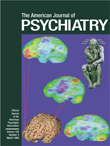Placebo-Controlled Study of the D4/5-HT2A Antagonist Fananserin in the Treatment of Schizophrenia
Abstract
OBJECTIVE: The authors’ objective was to assess the potential efficacy of fananserin (RP62203), a potent antagonist at the D4 and serotonin2A (5-HT2A) receptors, on symptoms of schizophrenia. METHOD: A double-blind, placebo-controlled study was conducted in 97 patients. Doses of fananserin reached 250 mg b.i.d. over 28 days, starting with an 8-day escalation. Most of the patients were men with paranoid schizophrenia; they were approximately 38 years old. The primary outcome measure was the total Positive and Negative Syndrome Scale score. The patients’ mean score on the Positive and Negative Syndrome Scale at entry was 91.8 (SD=16.5). A low dropout rate was observed in both groups of patients (19 [30%] of those given fananserin and nine [27%] of those given placebo). RESULTS: The total Positive and Negative Syndrome Scale score of the patients given fananserin decreased at endpoint by a mean of 4.2 points (SD=15.4); the score of the patients given placebo decreased by 6.7 points (SD=19.6). No differences between treatments were found on secondary measures such as the Clinical Global Impression, Positive and Negative Syndrome Scale subscores or individual items, and Brief Psychiatric Rating Scale total score. The patients’ extrapyramidal symptoms did not worsen during the trial, but the patients given fananserin had an increase in akathisia. The safety profile was good in both groups of patients. CONCLUSIONS: The results of this study do not support the prediction that a selective D4 antagonist associated with strong 5-HT2A antagonism will exhibit an antipsychotic effect. (Am J Psychiatry 1999; 156:419–425)



